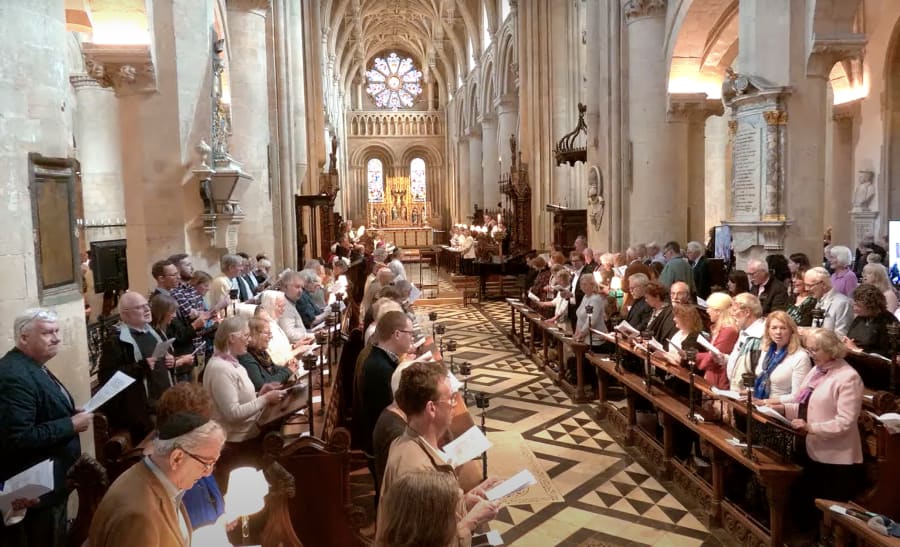The Church of England apologizes to Jews for medieval laws that led to arrests, executions and eventual expulsion in 1290
Anglican church only came into existence three centuries after these decrees, but Archbishop of Canterbury said he hopes this act will inspire Christians "to reject contemporary forms of anti-Judaism and anti-Semitism"

The Church of England has apologized for medieval laws that eventually led to the expulsion of the then roughly 3,000 Jews living in England.
The apology was offered at a special service at the Christ Church Cathedral in Oxford on Sunday, exactly 800 years after the laws were passed. Britain’s Chief Rabbi Ephraim Mirvis and representatives of Archbishop of Canterbury Justin Welby attended the service.
The anti-Jewish laws were passed by the Synod of Oxford, a gathering of leading bishops and priests, in 1222.
“The Oxford decrees forbade the Jews from building synagogues where they had not settled before, introduced badges so that the Jews could be differentiated and forbade sexual and many social relations between Jews and non-Jews,” according to James Parkes, professor of Jewish/non-Jewish Relations at the University of Southampton. “Jews were not to remain in England unless they could support themselves. While the implementation of these regulations was slow and uneven, it is not unreasonable to see them as paving the way for the expulsion of the Jews from England in 1290.”
Later on, more edicts forbade the Jews from owning land and passing on an inheritance to their children. Because of the anti-Jewish decrees, hundreds of English Jews were arrested, hanged or imprisoned. Eventually, in 1290, all English Jews were expelled from England. They were only readmitted to the country in 1656 under Oliver Cromwell.
“This anniversary, arranged in association with the Oxford Jewish Congregation, offers a symbolic opportunity to apologize for these shameful actions,” the Diocese of Oxford (the Church of England in Berkshire, Buckinghamshire and Oxfordshire) said in a statement last month ahead of the event. “It also recognizes the positive reframing of Jewish-Christian relations since the publication of Nostra Aetate (‘In Our Time’), a report of the Second Vatican Council in 1965: ‘this Synod…deplores and condemns hatred and persecutions of Jews, whether they arose in former or in our own days’. This understanding was reinforced by the Archbishop of Canterbury’s call, in the 2019 Church of England report, God’s Unfailing Word, that ‘only by looking back and recognising our failures as Christians can we begin to move forward with authenticity.’”
In an afterword to the 2019 Church of England report, Chief Rabbi Mirvis wrote, “How I would love to call out, back through the annals of history, to let my ancestors know that there would be a time of warm friendship between successive Archbishops of Canterbury and Chief Rabbis.”
“Today’s service is an opportunity to remember, repent and rebuild,” the Archbishop of Canterbury, who did not participate in the event, tweeted. “Let us pray it inspires Christians today to reject contemporary forms of anti-Judaism and anti-Semitism and to appreciate and receive the gift of our Jewish neighbors.”
Parkes has pointed out that the apology might come across as “odd” because it is being made by the Anglican Church, which was not in existence at the time of the 1222 Oxford Synod, but was only established when the English King Henry VIII broke with the Catholic Church in the 1530s.
“What is odd about this apology is that the Anglican church would not come into existence until over three centuries after these decrees,” the professor wrote. “In short, the dominant Protestant voice in the UK is now apologizing for pre-Reformation Catholic initiatives.”
The Roman Catholic Church, however, is “fully in accord” with the apology, according to Jonathan Chaffey, archdeacon of Oxford.
Speaking before the event, Chaffey also said: “On Sunday 8 May we will celebrate the positive Jewish-Christian relations and reaffirm our joint commitment to continue strengthening these interfaith relations, learning together and speaking out against prejudice. Part of this commitment includes the ongoing work of the Council of Christians and Jews and support for Christian and Jewish engagement, education and social action.”

The All Israel News Staff is a team of journalists in Israel.














